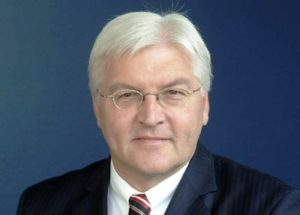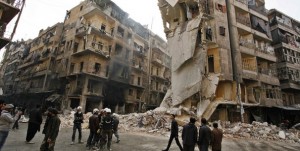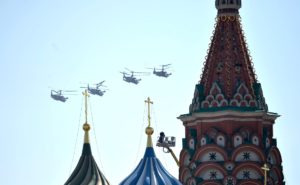The Warnings of a New World War
The U.S.-Russia confrontation over Ukraine and now Syria is far more dangerous than is understood by mainstream U.S. analysts as Russia lays down clear warnings that are mostly being ignored, writes Gilbert Doctorow.
In an interview with the Bild newspaper on Oct. 8, German Foreign Minister Frank-Walter Steinmeier, who is known for his cautious rhetoric, described the present international situation in the following woeful terms: “unfortunately it is an illusion to believe this is the old Cold War. The new times are different; they are more dangerous. Previously, the world was divided, but Moscow and Washington knew each other’s red lines and respected them. In a world with many regional conflicts and dwindling influence of the great powers, the world becomes more unpredictable.”
For these reasons, said Steinmeier, “The USA and Russia must continue talking with each other.” He concluded his appeal with fairly balanced recommendations to resolve the humanitarian crisis in east Aleppo, urging both Russia and the other powers to apply their influence with their clients on the ground.
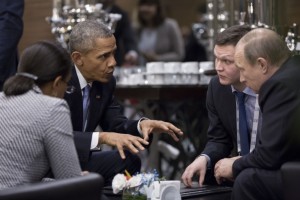
President Barack Obama meets with President Vladimir Putin of Russia on the sidelines of the G20 Summit at Regnum Carya Resort in Antalya, Turkey, Sunday, Nov. 15, 2015. National Security Advisor Susan E. Rice listens at left. (Official White House Photo by Pete Souza)
Sad to say, this call to reason fell on deaf ears. On the same day, a U.S. State Department spokesman explained to journalists Washington’s decision over the weekend to end the joint peace process with Moscow, saying that there was “nothing left to talk about with the Russians.”
Meanwhile, the Russian side took as the last straw this unilateral and trumpeted decision of the Americans to bury the deal signed on Sept. 9 between Secretary of State John Kerry and Russian Foreign Minister Sergey Lavrov that had taken 14 hours to negotiate and was seen as a triumph of cooperation versus confrontation.
De facto, from the Russian view, that deal was sabotaged on Sept. 17 by the Pentagon when U.S. and coalition aircraft bombed a Syrian government military outpost at Deir Ezzor killing more than 60 Syrian soldiers. And de facto, the Russians had suspended the implementation of the ceasefire on Sept. 23 when they renewed heavy bombing of east Aleppo in close collaboration with the Syrian air force and ground units. Now that the U.S. had formalized the end of cooperation over Syria, Russia set out its own full-blooded response which it called a “radical change in relations” between the two countries.
Several of the components of the Russian response of Oct. 3 and over the week to follow were noted in the U.S. and Western mainstream media. We heard about the decision to cancel the bilateral convention concluded with the U.S. in 2000 on reprocessing excess weapons-grade plutonium for electricity generation. This was widely considered to be of marginal importance, since the U.S. had been unable to implement its part of the bargain for lack of appropriate conversion installations and costs of upwards of $18 billion if it did what was necessary.
We heard about Russia holding civil defense exercises to provide for 40 million citizens, though no one could make much sense of it. We heard about the announcement of the Russian Ministry of Defense that it now has brought to Syria and made operational its most advanced air defense missile systems, the S300 and S400, but Pentagon spokesmen professed to be dumbfounded and asked rhetorically what was the purpose of the move.
Finally, we all heard this week that Russia has officially deployed its hypersonic, potentially nuclear-tipped, 500 kilometer-range Iskander ground-to-ground missiles in its Kaliningrad enclave on the Baltic Sea sandwiched between Poland and Lithuania. The Polish military officials immediately expressed dismay, feeling under threat and said they were putting all their defense facilities on alert. But Pentagon spokesmen said there was no reason to view this deployment as different from the last deployment in Kaliningrad two years ago, which was just a training exercise.
Playing Down the Danger
From the foregoing, it would appear that the U.S. government was keen to play down to the general public the significance of the separately noted Russian moves last week. It is in this context that one must appreciate what an unofficial but authoritative Russian state television program last Sunday night did to add a few more important dots, to connect them all and to interpret for laymen what is the significance of the Russian démarches.
The state television program on the Rossiya 1 channel, Vesti nedeli (News of the Week), is presented by Dmitri Kiselyov. This two-hour show on prime time is the single most widely watched news broadcast in Russia with tens of millions of viewers. However, in cases like the Oct. 9 show, the real hoped-for audience of the first half-hour segment was in Washington, D.C., where its intent was to pour cold water over hotheads in the Pentagon and CIA – and bring the American leadership back to its senses.
Dmitri Kiselyov is not merely the anchorman of Vesti nedeli. He is also the boss of all news and information programming on state radio and television. He is tough and wears his patriotism on his sleeve. We may assume that what he says has been approved by the Kremlin.
Because of the importance of the message Kiselyov was delivering, I am going to quote heavily from my transcript of his narrative, only making minor cuts:
“This past week relations between the USA and Russia went through a sharp but expected turn. To bend over backwards further in the face of [American] lies has lost all sense and is simply harmful. By bending over backwards we mean looking for diplomatic compromises.
“We held endless expectations that the USA will finally separate the non-terrorists from the terrorists [in Syria]. We waited more than a year for this. But it is clear they did not want to. They are taking us and the whole world for fools. America is working on the side of Al Nusra [Al Qaeda’s Syrian affiliate], providing them with diplomatic cover; providing them with additional arms; helping them by their supposedly mistaken bombing of a Syrian army position.
“See the outbursts of anti-Russian statements in the U.S. mass media. If we continue with the Americans, our very presence in Syria will lose sense. Instead, working with the legal Syrian government, we can rid the country of terrorists, thereby ensuring security of the Middle Eastern region, Russia and Europe.”
Kiselyov continued: “Those who want to can join us. The U.S. seemed to want to join, then thought again and cut their military cooperation with Russia over Syria on Monday, with one exception, the channel of communication to avoid military clashes in Syria remains in force. For the time being.
“Formally the situation returned to where it was before Sept. 9 when Kerry and Lavrov reached their agreement on a truce. But then [U.S. Defense Secretary] Ashton Carter entered the picture. He opened a second front. He forced Kerry to fight on two fronts. If Kerry previously thought he was competing with the Russians, now he came under “friendly fire” from the Pentagon.
“American forces directly bombed a Syrian military outpost. This was no mistake. It was coordinated with the terrorists, who followed up with an attack. Then there came a camouflaged attack on the humanitarian convoy near Aleppo [Sept. 20]. Finally, it became clear to Moscow that diplomacy is merely a ‘service’ for the Pentagon. Kerry, in intellectual style, justifies the actions of the Pentagon. Often, post factum.
“We will review tonight the radical changes in our relations with America. This includes the dispatch to the region of three of our cruise missile vessels with Kalibr on board. The roll-out in Syria of additional air defense systems S300. The dispatch to Egypt of 5,000 of our paratroopers. The tearing up of our agreements with America in the atomic sphere. And the civil defense exercise of the past week which involved 200,000 civil defense personnel covering 40 million population. To my recollection such a constellation of events never before took place.”
Terrorists and Hostages
Kiselyov went on: “The center of attention has been east Aleppo, still in control of terrorists with hundreds of thousands of civilians kept hostage as a human shield. They execute people who want to leave. We cannot tolerate this anymore. The terrorists are not capable of abiding by agreements. The Syrian army is carrying out a storm operation.
“There is so much lying and shrieking going on in the world about this. … It’s a serious matter that the U.S. is looking at Russia’s actions to combat terrorists in Syria as a threat to its own exceptionalism. The scenario is not developing according to the U.S. plan, so what is the sense of all the claims to U.S. domination and leadership. It looks as if Barack Obama will leave office before Bashar Assad. And their nasty tricks against Russia, the sanctions, aren’t working…
“To be sure, Washington has loudly announced that it is shifting now to the so-called Plan B. Formally there are no details. But in general terms, everyone understands what we are talking about. Plan B is when America applies in Syria direct military force. It is not hard to guess against whom, against Bashar Assad, the government army, and that means against the armed forces of Russia, who are present in Syria on legal grounds.
“Can we exclude such a variation? No. We cannot exclude provocations to justify the start of war, as happened in the past in the two world wars. The Vietnam War also began with a provocation organized by the Americans. See the false pretenses for invading Iraq and the action in Libya. U.S. ignored international law, decided there can be no obstacles in the path of their assaults.”
Kiselyov continued: “Moscow reacted calmly to Plan B. Russia saddles up slowly, but then rides fast. To understand how Russian-American relations have just quickly changed directions, we have to rewind and go back to the start of the week. Let us now scrupulously go over events since Monday.
“First I want to direct your attention to the very public speech of [Russian President Vladimir] Putin. He spoke more quietly and more slowly than usual. Formally it was to open the session of the new 7th Duma. But it was addressed to the very core issues of our souls and minds. His words were not about draft laws, but to the essence of the moment. Putin considered it important to talk about the general basis of support. He spoke about unity of the people as an essential element for the existence of our country. Strength is essential to maintaining our statehood.
“At this Duma session, Putin introduced draft law to halt the convention on plutonium with the USA.”
Kiselyov here makes an association between Putin’s speech to the Duma and the draft law halting the convention on plutonium that would not be obvious to outsiders. Still more important, he called attention to the contents of that draft law, beginning with the reason given for this event, namely what is called a “radical change in circumstances, the emergence of a threat to strategic stability as a result of hostile actions of the United States of America in relation to the Russian Federation and the inability of the United States of America to ensure execution of the obligations it assumed to reprocess the excess weapons grade plutonium in accordance with the Agreement and the protocols to the Agreement.”
Kiselyov then moved to the all-important Point 2 of the draft law. The text was projected onto the television screen, with its provisions highlighted in yellow as Kiselyov read from it. The highlighted passages are as follows:
“The validity of the Agreement and protocols to the Agreement can be renewed after the elimination by the United States of America of the causes which have led to a radical change in the circumstances which existed on the day of the coming into force of the Agreement and the protocols to the Agreement on condition:
“1) that the military infrastructure and numbers of the contingent of troops of the United States of America stationed on the territories of member states of the North Atlantic Treaty Organization (NATO) which entered NATO after 1 September 2000 be reduced to their levels on the day of coming into force of the Agreement and protocols to the Agreement
“2) that the United States of America renounces its hostile policy with respect to the Russian Federation which must be expressed:
“a) by the repeal of the 2012 law of the United States of America (Sergei Magnitsky law) and the repeal of provisions of the 2014 law of the United States of America in support of freedom of Ukraine directed against Russia
“b) by the cancellation of all sanctions introduced by the United States of America with respect to separate subjects of the Russian Federation – Russian individuals and legal entities
“c) compensation of damages borne by the Russian Federation as a result of the sanctions indicated in line ’b’ of this point, including losses from the introduction of necessary counter-sanctions against the United States of America
“d) presentation by the United States of America of a clear plan for irreversible reprocessing of plutonium coming under the scope of the Agreement.”
A Breathtaking Ultimatum
Kiselyov rightly called these provisions an “Ultimatum” addressed to the White House. Their scope is breathtaking. But the Kremlin’s message to Washington was action, not just words.
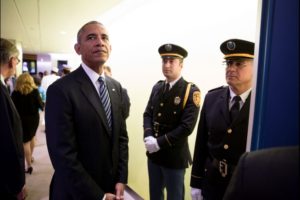
President Barack Obama waits backstage before making his last address at the United Nations General Assembly in New York, Sept. 20, 2016. (Official White House Photo by Pete Souza)
Kiselyov explained that on Tuesday the government stopped an ongoing program of scientific contacts with the U.S. in the nuclear field. On the same day it cancelled a program of cooperation between Rosatom and the U.S. Department of Energy over nuclear reactors.
Then, as Kiselyov noted, the Russians “moved from the brakes to the gas pedal.” They dispatched three missile bearing naval vessels from the Black Sea fleet to the Eastern Mediterranean as a back-up in case the U.S. proceeds on Plan B. These are equipped with two types of missiles: the Kalibr cruise missile which may be nuclear tipped and has a 2,600 kilometer range for striking ground targets plus the supersonic Oniks for attacking ships.
Also on what he chose to call “Black Tuesday,” the Russian government confirmed that it has installed its S300 air defense system in Syria. For the explanation, Kiselyov pulled up video recordings of the televised statement by the chief of the press and information service, the Russian Federation Ministry of Defense Igor Konashenkov, who was responding to questions about the Syrian campaign.
Konashenkov said the air defense was installed because of U.S. and French threats to impose a “no fly zone” and because of the lessons learned from the U.S. coalition strike against Syrian forces at Deir Ezzor on Sept. 17. Konashenkov stressed that there will likely be no time for any hot-line discussions with Americans about stealth aircraft or incoming missiles: they will be shot down, “whatever the dilettantes” in American military circles may think.
He explained that Russian military are in settled areas across Syria performing humanitarian work and dealing with local Syrian militia who are laying down their arms under Russian-brokered deals. Therefore, any U.S. air strikes in Syria will likely also hit Russian forces, which is utterly unacceptable.
Next, Kiselyov reminded his audience, on Wednesday, Russia officially notified Washington that it deems the missile defense installations that the United States has built in Romania and is building in Poland are in violation of the convention on intermediate-range missiles since they can be used for offensive as well as defensive rockets.
Russia is not presently withdrawing from the convention on intermediate-range missiles, which was the single biggest arms control agreement of the Reagan-Gorbachev years, but it is preparing the way for abrogation at its choosing. This was the context for Moscow’s announcement on the same day that they have installed their Iskander missile system in Kaliningrad. The suggestion is that this is permanent, not linked to any exercises.
During the same week, the Russian Ministry of Defense announced an unprecedented military exercise in Egypt with dispatch there of 5,000 paratroopers equipped with new, desert-condition uniforms and a new design parachute.
Russian Overseas Bases
According to Kiselyov, Russian Deputy Minister of Defense Pankov said his ministry is reviewing the question of reestablishing military bases in Cuba and Vietnam. And, on the anniversary of its launch into space of the first Sputnik, Moscow celebrated the Day of the Rocket Corps by showing clips of recent “awesome” rocket launches.
Summing up, Kiselyov acknowledged that all these events give the impression of a highly charged atmosphere. They are, he said, all the consequence of America’s steady campaign of expanding NATO, its renunciation of the ABM treaty, its color revolutions, its vilification of Russia, and its information war based on lies. These unfriendly acts had to be a stop.
He asked rhetorically: is this dangerous? To which he responded in the affirmative.
And yet, if Russia is morally and physically prepared for war with the United States to defend what it sees as its national interests, including in Syria, Kiselyov ended the half-hour segment of his weekly news wrap-up on a non-belligerent note. He said the message of the Russian government was its preparedness for the worst while it hopes for better outcomes. He quoted Dmitri Peskov, Putin’s press secretary, who insisted that Russia is always ready for cooperation.
Bad as the enumeration of Moscow’s “radical change in relations” with the United States sounds, the overview of Russian actions and intentions on the Kiselyov program was not exhaustive. In the same week, there were leaks of Russian plans to establish what never existed in the Cold War, a naval base in Egypt, which it is said would support their operations in the Western Mediterranean.
It bears mention that the whole subject of military bases abroad came up on another prime-time flagship program of Russian state television, the Oct. 9 edition of “Sunday Evening with Vladimir Soloviev,” the most popular and respected talk show of the same Rossiya 1channel.
In a departure from common practice, this edition featured only Russian panelists, mostly of high standing. The single highest-rated politician panelist was Irina Yarovaya, the tough-as-nails and very smart Duma deputy known best as the author of what Edward Snowden called the Big Brother law this past July. Yarovaya was newly named as Deputy Chair of the State Duma and opened the show, which focused on U.S.-Russian relations and comparative military strength.
Yarovaya remarked on how in 1992 the U.S. defense budget was 77 times greater than Russia’s whereas last year it was just 10 times greater. Today, she noted, the U.S. accounts for 36 percent of total global military expenditures while Russia represents 4 percent. Why does the United States need this disproportionately sized military establishment? Answer: to dominate the political landscape. In this context, she explained, Russia now is throwing cold water on that notion of domination.
At this point, the second-ranking politician on the show entered the debate with an important qualification. Vladimir Zhirinovsky is the leader of the nationalist LDPR party, which did remarkably well in the September elections and was given the Duma committee chairmanship of foreign relations as a reward, another detail of Russian political life that has gone virtually unnoticed in U.S. and Western commentary.
Zhirinovsky insisted that the correlation of military capabilities is more favorable to Russia than the gross figures suggest. After all, he explained, a large chunk of the U.S. defense budget goes on toilet paper, sausages and similar housekeeping expenses in support of its 700 foreign bases.
Notwithstanding that caustic remark about bases generally and eyes-open understanding that such force projection is also debilitating, Zhirinovsky later in the program suggested that Russia would do well to establish 100 overseas bases.
To understand properly what this question of possible Russian military bases overseas means, we have to recall that, in the not so distant past, Vladimir Putin pointed to the country’s having no overseas bases as a distinguishing point setting Russia apart from superpowers. We have no ambition to be a superpower, he said then.
The Risky U.S. ‘War Party’
Those in the U.S. “war party” who talk about Putin’s dream of reestablishing the Soviet Union are repeating endlessly complete nonsense. But there is a dream, a very new dream in Moscow which did not exist until the present direct and existential confrontation with the U.S. that Russia will be understood to be not just a great power but a superpower with global interests.
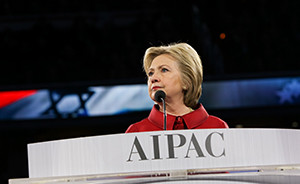
Former Secretary of State Hillary Clinton addressing the AIPAC conference in Washington D.C. on March 21, 2016. (Photo credit: AIPAC)
In this sense, by presenting Russia with hostility and enormous challenges, the United States has been creating the very Russia it fears.
All of the information that I have used in this commentary are open source. The television programs are all accessible as they are to the U.S. intelligence officers stationed in the U.S. embassy in Moscow. They are also accessible to any Russian-speaking analysts in Langley who happen to be interested since they are posted within 24 hours on youtube.com.
Moreover, the CIA has its own agent taking part in the prime-time talk shows several days a week. He is a welcome and paid guest of the Russian state television because of his outstanding Russian language skills and his defense of the policy line coming from Washington, which makes him the American that Russian viewers love to hate.
In this capacity, he rubs shoulders regularly with the leading Russian politicians on the shows and has a chance, in the breaks, to put to them the kind of question that one such politician said he raised a week ago: “Will there be a war?”
If the U.S. intelligence establishment is doing its job professionally, and we must assume that is the case, then they have been briefing President Obama and the two presidential candidates on the developments in U.S.-Russian relations that I have outlined above.
In that case, a puzzling and scandalous question arises: why has the President not said a word about the “radical change in relations” with Russia? And why is it that neither candidate when asked about how to respond to the killings in east Aleppo on Debate Two, that very same evening, on Oct. 9, were clueless.
Indeed, the remarks of Hillary Clinton to the effect that the United States must stand up to the Russians and impose a “no-fly zone” in Syria missed the point that to do so now will mean destruction of U.S. aircraft and naval vessels, or, in other words, the onset of World War III. Either she and her policy team do not have their eye on the ball or they are playing a reckless game.
For his part, Donald Trump came out marginally better on the issue of what to do about east Aleppo. He said that, as he understands, it’s lost already. That appraisal is much closer to reality.
The end result of the official silence in the U.S. about Russia’s message of defiance and about its military wherewithal in place in Syria to defend what it construes as its national interest is that as a nation the U.S. is flying blind.
Gilbert Doctorow is the European Coordinator of The American Committee for East West Accord. His most recent book, Does Russia Have a Future? was published in August 2015.
